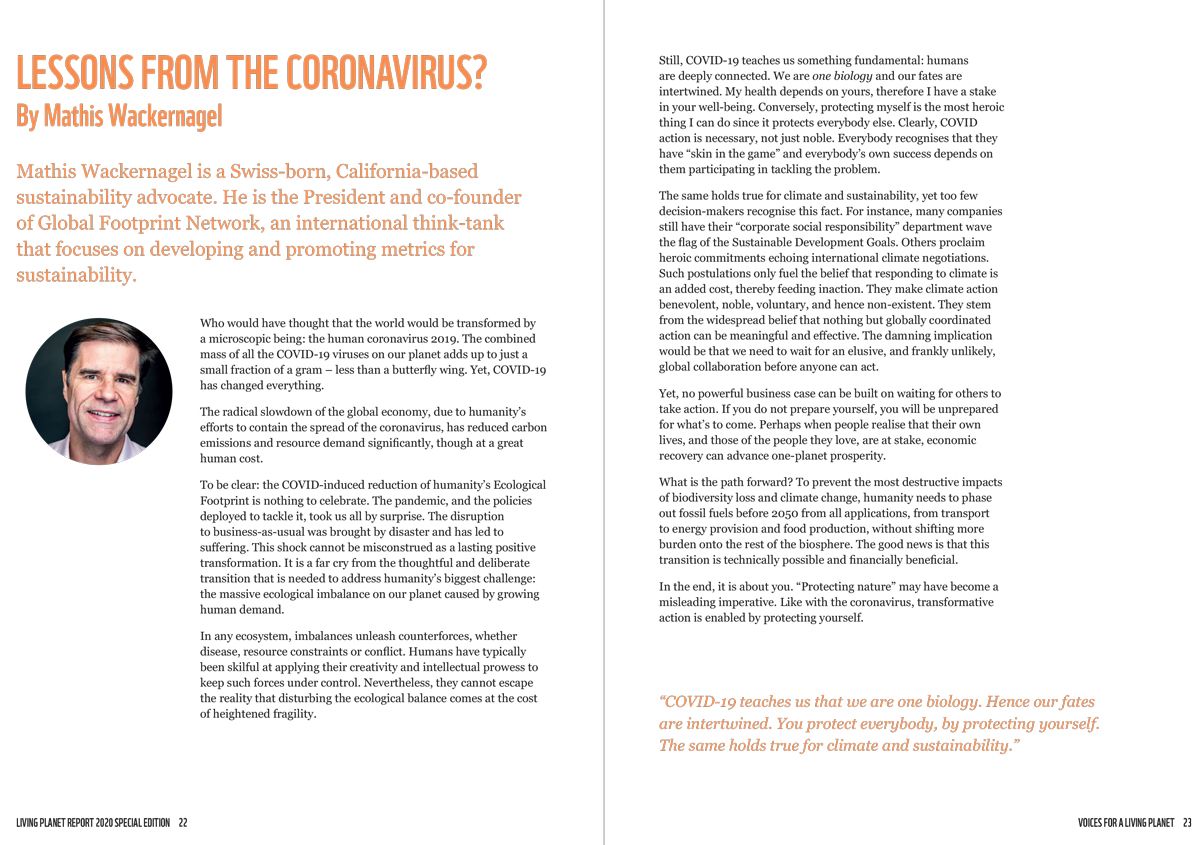“COVID-19 teaches us that we are one biology. Hence our fates are intertwined. You protect everybody, by protecting yourself. The same holds true for climate and sustainability.”
Who would have thought that the world would be transformed by a microscopic being: the human coronavirus 2019. The combined mass of all the COVID-19 viruses on our planet adds up to just a small fraction of a gram – less than a butterfly wing. Yet, COVID-19 has changed everything.

The radical slowdown of the global economy, due to humanity’s efforts to contain the spread of the coronavirus, has reduced carbon emissions and resource demand significantly, though at a great human cost.
To be clear: the COVID-induced reduction of humanity’s Ecological Footprint is nothing to celebrate. The pandemic, and the policies deployed to tackle it, took us all by surprise. The disruption to business-as-usual was brought by disaster and has led to suffering. This shock cannot be misconstrued as a lasting positive transformation. It is a far cry from the thoughtful and deliberate transition that is needed to address humanity’s biggest challenge: the massive ecological imbalance on our planet caused by growing human demand.
In any ecosystem, imbalances unleash counterforces, whether disease, resource constraints or conflict. Humans have typically been skillful at applying their creativity and intellectual prowess to keep such forces under control. Nevertheless, they cannot escape the reality that disturbing the ecological balance comes at the cost of heightened fragility.
Still, COVID-19 teaches us something fundamental: humans are deeply connected. We are one biology and our fates are intertwined. My health depends on yours, therefore I have a stake in your well-being. Conversely, protecting myself is the most heroic thing I can do since it protects everybody else. Clearly, COVID action is necessary, not just noble. Everybody recognizes that they have “skin in the game” and everybody’s own success depends on them participating in tackling the problem. The same holds true for climate and sustainability, yet too few decision-makers recognize this fact. For instance, many companies still have their “corporate social responsibility” department wave the flag of the Sustainable Development Goals. Others proclaim heroic commitments echoing international climate negotiations. Such postulations only fuel the belief that responding to climate is an added cost, thereby feeding inaction. They make climate action benevolent, noble, voluntary, and hence non-existent. They stem from the widespread belief that nothing but globally coordinated action can be meaningful and effective. The damning implication would be that we need to wait for an elusive, and frankly unlikely, global collaboration before anyone can act.
Yet, no powerful business case can be built on waiting for others to take action. If you do not prepare yourself, you will be unprepared for what’s to come. Perhaps when people realize that their own lives, and those of the people they love, are at stake, economic recovery can advance one-planet prosperity.
What is the path forward? To prevent the most destructive impacts of biodiversity loss and climate change, humanity needs to phase out fossil fuels before 2050 from all applications, from transport to energy provision and food production, without shifting more burden onto the rest of the biosphere. The good news is that this transition is technically possible and financially beneficial.
In the end, it is about you. “Protecting nature” may have become a misleading imperative. Like with the coronavirus, transformative action is enabled by protecting yourself.
Reference: WWF (2020) Voices for a Living Planet – Living Planet Report 2020 special edition. Grooten, M. Dillingh, S. and Petersen, T. (Eds). WWF, Gland Switzerland.


